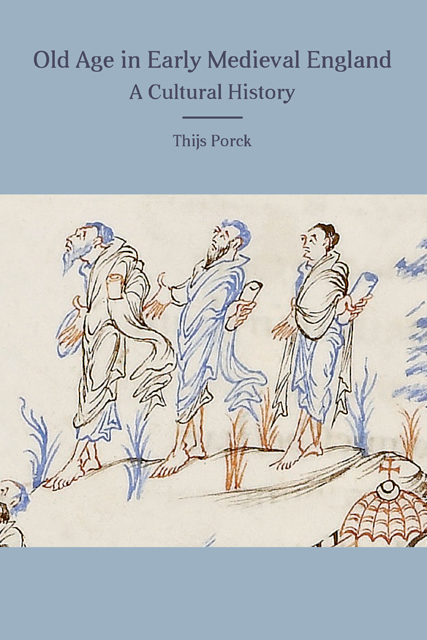Book contents
- Frontmatter
- Contents
- Illustrations
- Acknowledgements
- Abbreviations
- Introduction
- 1 Definitions of Old Age
- 2 Merits of Old Age
- 3 Drawbacks of Old Age
- 4 frode fyrnwitan: Old Saints in Anglo-Saxon Hagiography
- 5 hare hilderincas: Old Warriors in Anglo-Saxon England
- 6 ealde eðelweardas: Beowulf as a Mirror of Elderly Kings
- 7 gamole geomeowlan: Old Women in Anglo-Saxon England
- Conclusion
- Bibliography
- Index
- Anglo-Saxon Studies
7 - gamole geomeowlan: Old Women in Anglo-Saxon England
Published online by Cambridge University Press: 17 January 2023
- Frontmatter
- Contents
- Illustrations
- Acknowledgements
- Abbreviations
- Introduction
- 1 Definitions of Old Age
- 2 Merits of Old Age
- 3 Drawbacks of Old Age
- 4 frode fyrnwitan: Old Saints in Anglo-Saxon Hagiography
- 5 hare hilderincas: Old Warriors in Anglo-Saxon England
- 6 ealde eðelweardas: Beowulf as a Mirror of Elderly Kings
- 7 gamole geomeowlan: Old Women in Anglo-Saxon England
- Conclusion
- Bibliography
- Index
- Anglo-Saxon Studies
Summary
bryd …
gomela iomeowlan golde berofene
Onelan modor ond Ohtheres (Beowulf, lines 2930b–2932)
[(Ongentheow’s) wife, the old woman of a former day, deprived of gold, mother of Onela and Ohthere]
With the possible exception of Grendel’s monstrous mother, Ongentheow’s wife is the only woman who is explicitly described as ‘old’ in Old English poetry. Typically, she remains nameless and is identified only by her relationship to three men: her husband Ongentheow and her two sons. This nebulousness is indicative of the relative lack of interest Anglo-Saxon poets appear to have shown in elderly women. Even in the unique case of the poem Elene, in which the main protagonist is the aged Helen (c.250–c.330), the poet Cynewulf appears indifferent to the old age of his main character. Though Helen is estimated to have been in her seventies when she made her pilgrimage to the Holy Land, Cynewulf never once refers to her old age. The paucity of older women in Old English poetry is enigmatic, especially given the widespread popularity of elderly female characters in classical and late medieval literature, such as Ovid’s Dipsas and Geoffrey Chaucer’s Wife of Bath.
In pastoral texts from the Anglo-Saxon period, old women feature only marginally. For Ælfric, the most prolific homiletic author of the Anglo-Saxon period, only one issue with regard to old women was worth commenting on at some length – their unabashed sexual appetite despite their inability to bring forth children. In his letter to Sigefyrth, for example, he classified the sexual needs of an elderly woman as shameful, since intercourse was only meant for procreation:
Hit byð swyþe sceandlic, þæt eald wif sceole
ceorles brucan, þonne heo forwerod byð
and teames ætealdod, ungehealtsumlice,
forðan ðe gesceafta ne beoð for nanum oðran þinge astealde
butan for bearnteame anum, swa swa us secgað halige bec.
[It is very shameful that an old woman should have sex with a man, when she is worn out with age and too old for childbearing, unchastely, because sexual relations are not meant for any other thing but procreation only, just as holy books tell us.]
- Type
- Chapter
- Information
- Old Age in Early Medieval EnglandA Cultural History, pp. 212 - 231Publisher: Boydell & BrewerPrint publication year: 2019



